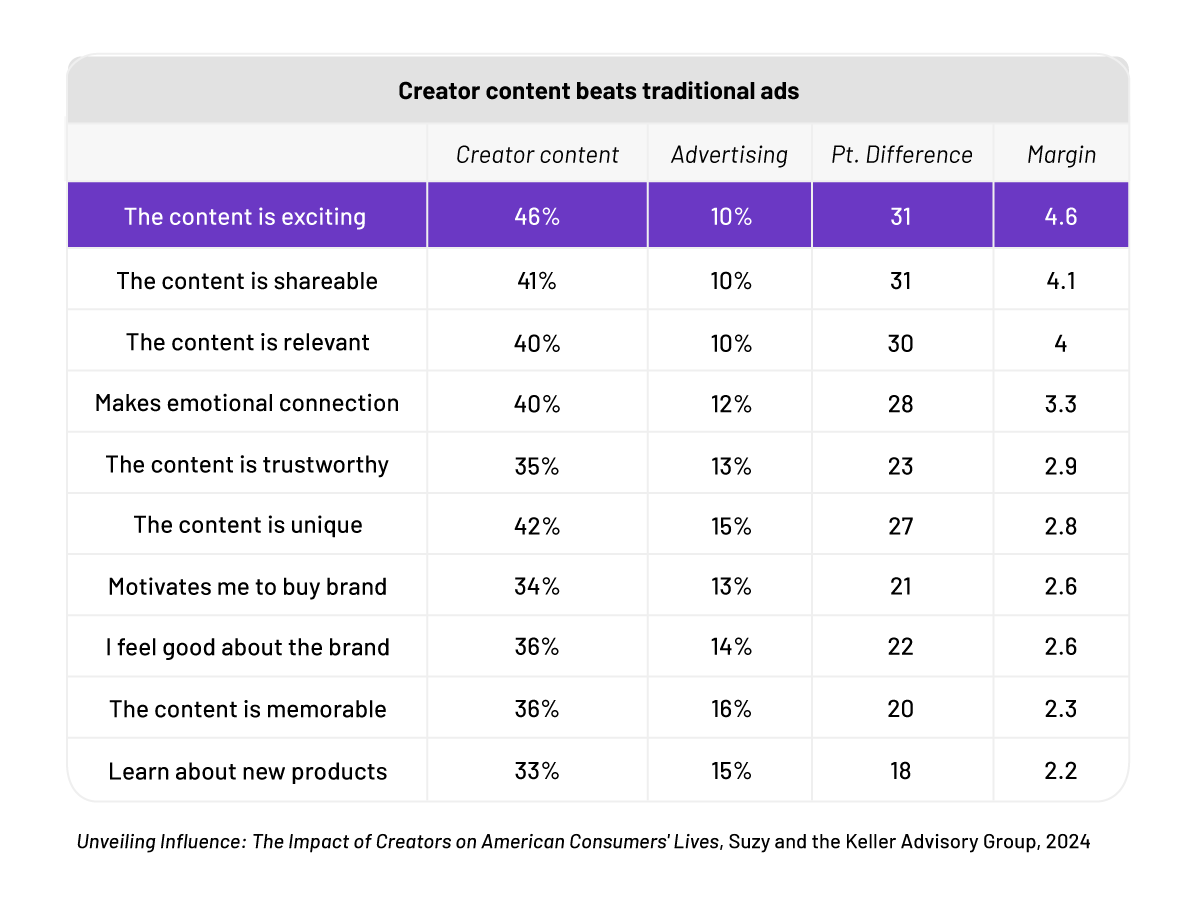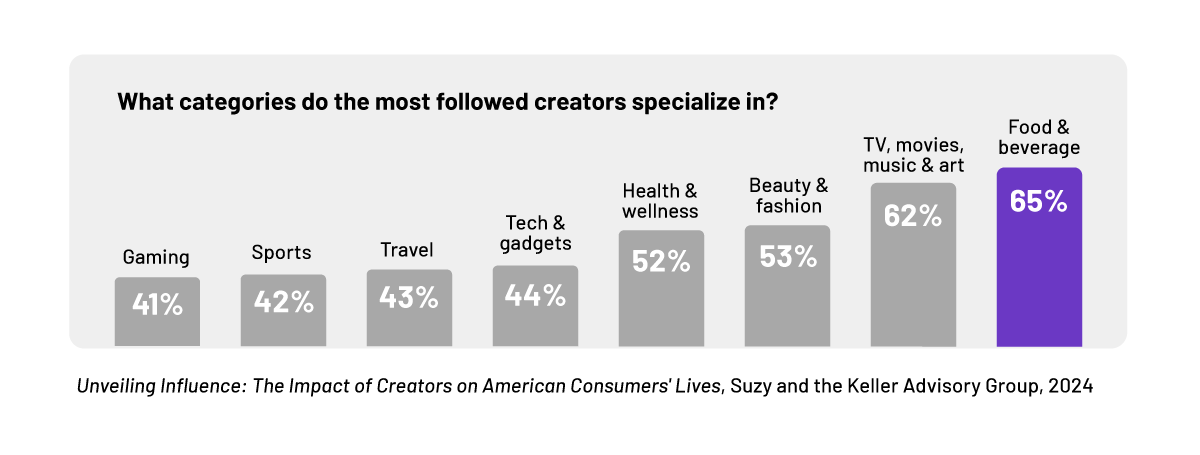"How Cannes Lions 2024 became the Festival of Creators." That was the headline of an article by Digiday, which explained, "The power of the creator economy and its hold on the advertising industry [was] on full display at the Cannes Lions International Festival of Creativity this year."
In fact, for the first time, the festival had a new Creators track, LIONS Creators, a dedicated forum that included a mix of exclusive learning and networking experiences for creators and those working in the wider creator economy.
Chris Vollmer, Managing Director of MediaLink observed, "The festival has gradually begun to acknowledge, and most prominently this year, that there's a whole ecosystem well beyond Hollywood and traditional Madison Avenue where a lot of these brands are focused."
In short, 2024 is the year when the power and velocity of Creators moved from the periphery to the center of the world's biggest advertising event. And with good reason.
Creators Take Center Stage
In a world brimming with content, marketers seek new and better ways to connect with consumers. Enter creators -- social media influencers who have emerged as the new custodians of consumer trust, wielding the power to shape trends, influence decisions, and build communities. The creator economy has long been a buzzword, but understanding it is no longer optional; it's imperative for brands looking to thrive in a marketplace where authenticity and connection reign supreme. But what do brands need to know about the creator economy today? And how are consumers engaging with creators? New research sheds important light to illuminate the best path forward.
Creators are capturing America's attention, big time. According to "Creators Uncovered" which we released late last year, there are a staggering 27 million paid creators in the U.S., representing 14% of consumers aged 16-54.
A newly released companion study, "Unveiling Influence," which we conducted in partnership with Suzy, reveals the vast following of these creators, with 69% of Americans ages 16-54 following them. Moreover, 60% of followers interact with creator content daily, showcasing the shift towards creator-driven content as a key component of daily entertainment and information consumption.
In Creators We Trust
Key to the rising engagement with creator content is the fact that consumers place significant trust in it. It has long been the case that consumers trust what they learn from family, friends, and co-workers, and that remains the case today (75%). Creator content almost reaches that bar, at least content from certain types of creators, namely those specializing in a specific area, with 62% of Americans valuing their insights. This highlights the role of specialized creators as credible sources of information within their domains. In contrast, considerably fewer consumers trust recommendations from celebrity influencers (44%) or advertising (40%).
The Power of Creator Content vs. Advertising
Creator content not only reaches a broad audience but also outperforms conventional advertising. Consumers find creator content more exciting by a margin of 36 points, unique (+31), emotionally engaging (+28), relevant (+30), and shareable than traditional ads (+31). In fact, across 10 attributes, creator content consistently surpasses traditional advertising.

Creator Content Cuts Across a Wide Range of Categories.
Several content categories stand out as particularly engaging to consumers. Food, beverage, and cooking content is at the forefront, with 65% of respondents captivated by its rich, appealing videos and posts. Entertainment follows closely, engaging 62% of those who follow creators. Beauty and fashion, as well as health and wellness, also attract significant audiences, with followings of 53% and 52%, respectively. These varied content preferences showcase the adaptability of creators to meet diverse consumer interests.

Informative and Entertaining Content
Consumers enjoy creator content for its ability to inform and educate while providing entertainment. Humor and informative content are the primary drivers, each cited by 67% of respondents. Additionally, majorities follow creators to learn new things (54%) and because of shared interests (50%). These findings highlight a dual quest among digital consumers: the desire for entertainment and the pursuit of knowledge and community. Creators who effectively blend these elements are likely to capture and retain dedicated followings, making them powerful allies for brands.
Show Me the Money: Consumers Act Based on Creator Content
An overwhelming 80% of respondents report taking some form of follow-up action inspired by creators. This not only highlights the reach of content creators but also their ability to spur engagement beyond passive consumption.
A significant 55% of those influenced have researched a brand's website after discovering it through a creator. This initial step can be crucial for brands in drawing consumers into their ecosystem, providing an opportunity to engage them with more in-depth information about their products or services. Moreover, 46% of respondents followed a brand on social media following a creator's endorsement, representing a direct line to consumers and offering brands repeated opportunities to engage through content.
Perhaps most compelling is the conversion of this influence into sales, with 43% of those influenced by creators making a purchase. This statistic clearly indicates the ROI that influencer marketing can offer, demonstrating that creator endorsements not only capture attention but also persuade action. Furthermore, the cycle of influence often doesn't stop at the point of purchase; 42% of respondents recommended brands to someone else, expanding the reach and impact of the initial creator endorsement through word-of-mouth -- a powerful tool in any marketer's arsenal.
Bottom Line
The key to successful marketing in the mid-2020s is meeting consumers where they are. Brands can do that by leaning into trustworthy, entertaining, informational, and relevant creator-based content. Brands that recognize and harness the power of creators will find themselves not just participating in the market but shaping its future.
In today's rapidly evolving landscape -- where culture, the economy, and consumer behaviors are in constant flux -- brands must stay well informed. Understanding which creators resonate with your target audience and the types of content they prefer is crucial. Effectively leveraging this consumer feedback can significantly enhance your influencer marketing strategies, connecting you with the right creators to amplify your brand's messaging.
This article was co written with Heather Evans, a passionate market research veteran who successfully launched two major brand measurement products, including The Keller Fay Group's TotalSocial. She excels at weaving together word-of-mouth, social media, and influencer data into compelling stories for many of America's biggest brands.
Click the social buttons to share this story with colleagues and friends.
The opinions expressed here are the author's views and do not necessarily represent the views of